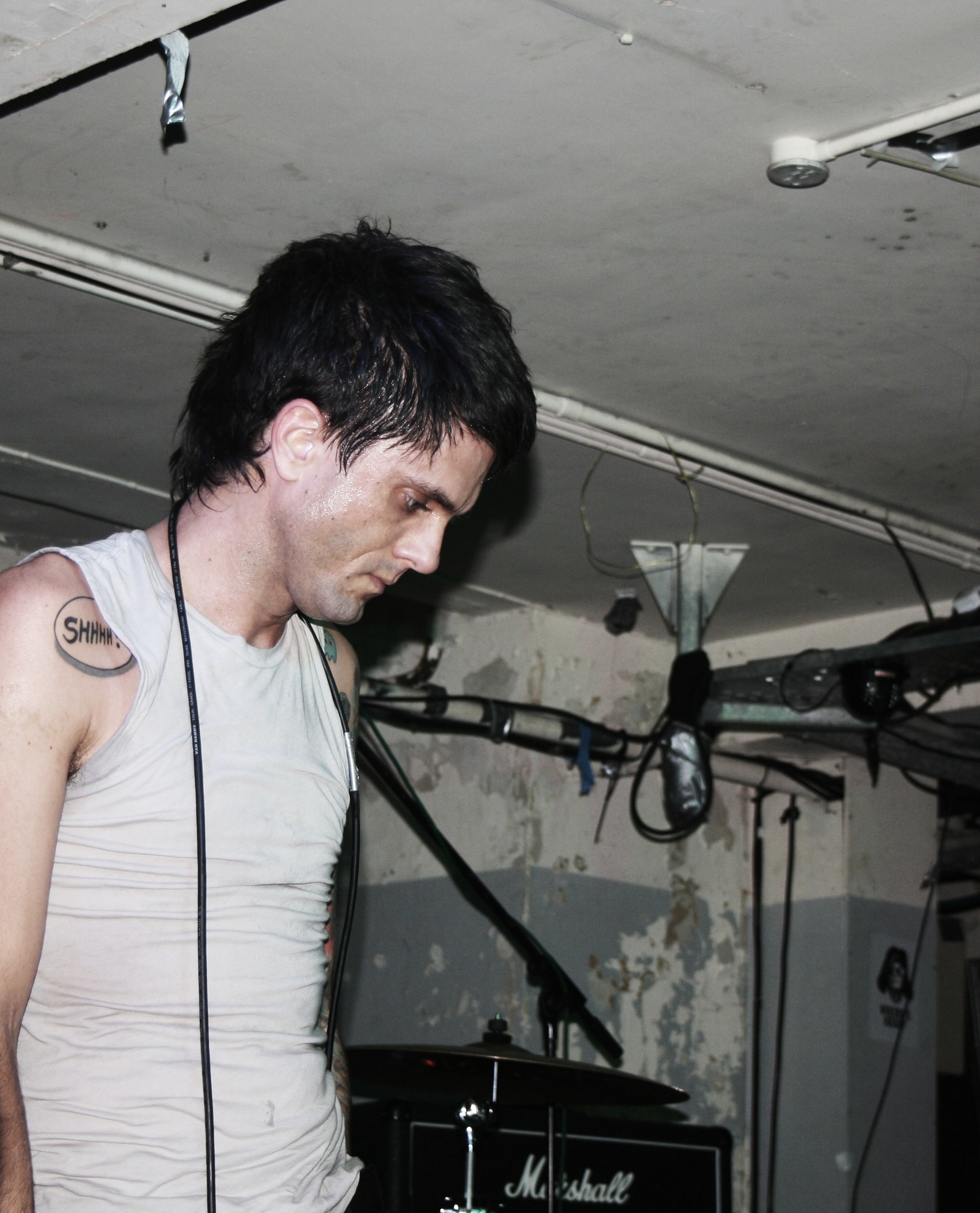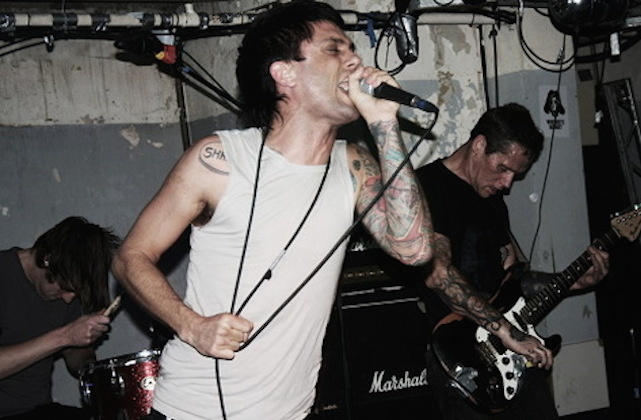If you hate linear structure and enjoy music that sounds like someone digesting a lawnmower over two guitars being tortured as much as I do, then you know the name Justin Pearson. Now 39, Pearson has been in touring bands since he was 15 but is probably most widely known for his involvement in The Locust, the John Peel-approved grindcore band whose aim was to “change the way people perceive music, or maybe just destroy it in general.”
One of his first groups, Swing Kids, carried the art hardcore movement way into the late 90s and are pretty much considered to have mastered the spazz-jazz formula that Refused became so widely acclaimed for before Refused formed. He founded the San Diego based label Three One G in 1994, which has since been home to almost all of the bands he’s been involved with, including but not limited to The Locust, Retox, Some Girls, Holy Molar, Struggle, Head Wound City and All Leather. The label has also functioned as something of a fly strip for weirdo spazz-bands like The Blood Brothers, Arab on Radar and Unbroken. He’s published books, scored films, and trolled Jerry Springer. Basically, if you removed Justin Pearson from punk there would be a massive fucking gap where history should be.
Videos by VICE
Most recently, Retox just released their third album, Beneath California. Noisey premiered the video for one of it’s singles earlier this year and it features a man getting chased in slow motion by the dude from the Dillinger Escape Plan wielding a baseball bat and also the lyric, “Everyone fucks each other in their own backseats.” So there’s that.
I first met Justin Pearson in 2011 when Retox were touring the UK for the first time. He was the first ever music person I interviewed that I actually cared about. I was probably really awkward and during the show he punched a dude in the crowd for being a shithead. We met up again in a vegan cafe in Brighton last week. We both enjoyed a soya-based beverage, I tried to be less socially inept, and he tried not to swear too much in front of the children sitting next to us.
Noisey: Hi Justin.
Justin: What did you get?
A vanilla milkshake. Brighton is one of the few cities in the UK that actually does vegan junk really well so you have to take advantage, you know? So, lots has changed since I last saw you in 2011. For one you have a new album, Beneath California, which came out in February. How would you describe it to people who’ve never heard Retox before?
When people ask “What kind of music do you play?” I just say “annoying”. I mean, it’s funny to say that but also it genuinely is annoying. It’s like being punched in the face by a singer.
Last time we spoke you said something along the lines of music being the only form of effective communication because it can cross the boundaries of gender, class and race, which I think is true. Recently, though, we’ve seen a bunch of bands that have ill advised names like Viet Cong, Black Pussy, Slaves and stuff like that. As someone who doesn’t really shy away from confrontation, do you think they should change their names or does that kind of encroach on artistic license?
Well for one I’ve never heard of those bands, so they’re not doing a very good job. But I was interviewed in Paris the other night and this guy asked me about a band there called Rape. They were supposed to play the venue we played, but the venue said no and they got a lot of press because of it. There’s a weird philosophical discussion surrounding the name and their whole thing was like they were these younger kids who thought “if we make this offensive name we’ll get free publicity” and stuff. And I thought, I understand that, and I don’t think there should be censorship, but I think if they’re going to have a name like that they should at least be able to back it up. But there’s no substance, they can’t argue anything. I mean, fuck it do whatever you want. If you want to be offensive, go for it, but you have to be able to back it up. That’s part of the problem. Their whole thing was everyone was complaining about censorship, but go fuck yourselves. If the owner of that bar doesn’t want a band called Rape playing there, sucks for you. You should open your own bar, you could play all the time.
Do you think it’s effective, in terms of getting attention?
It’s funny because after the interview I racked my brain trying to come up with a band that’s generally offensive that can back it up and the only band I could come up with – and I’m not a fan of them at all, but they definitely can back it up – is Anal Cunt. I mean, they were just like real legitimate scumbags and they were shitty and they were honest about it. I get being confrontational, but only when there’s some substance to it.
It raises some difficult questions: what if you love the music but the band is problematic? For instance Bad Brains are still considered to be one of the best punk bands ever, but they’ve got the whole history with homophobia, Cro-Mags are still revered but John Joseph is anti-abortion. How do you reconcile enjoying someone’s music if they’re shitty people? Should you?
The Bad Brains thing is interesting. There was this post from Hard Times, that satire site, about how they basically got a 30-year pass to be homophobic. When I was a kid I loved Bad Brains, then I realised they were homophobic and I heard the story about Big Boys. Bad Brains were ripping off on another punk band for being gay and I think that crosses the ethical line. Bad Brains are awesome but there were better bands that weren’t stupid. I don’t know, I just say fuck them.

Punk used to be a place that people went because it felt like they fitted in. Now it’s almost too cool for that. It’s been co-opted by people in expensive backpacks.
It’s complacent. No disrespect to certain bands, but when you see a band like Trash Talk it’s kinda like…cute. They’re all like “everyone sit down and everyone jump up now and everyone make a giant circle pit!” In the 80s when hardcore started, if you saw S.O.A or S. S. Decontrol or Teen Idols, no one would ever be like, “hey everybody let’s do this!” You’d get beat up, you’d look stupid. Today, a lot of people are complacent and lazy. It’s becoming safe again. The world’s changing and culture’s changing and it’s harder to be reactionary, it’s harder to be an activist. A lot of people’s activism is just like random stupid social media posts, and it’s like, well you gotta back it up. You have to do something about it.
Do you think music can encourage people to do something?
When Retox plays, there’s a certain type of energy where people are connecting with the sincerity and our release of aggression or angst and I think that’s relevant. When you’re going to see a punk rock band and it’s like “party rock”, that for me is strange. There’s artists like Andrew WK, where it’s almost ultimate party rock, but that guy’s legitimate. He’s so educated. He’s a really brilliant human being and a great artist, you know? He lives the life of a legitimate person concerned with social wellbeing and he’s found a way to make people connect on some level.
He is a giant ball of light.
The Locust did a tour with him and we were doing a Crossed Out cover in our set. One time we were setting up and he was like “Let me come out and sing the Crossed Out song with you”. I mean, this is a guy who has a Twix commercial and then he can come out and sing a Crossed Out song. If only everyone that was into the fun stuff had that other element added to it.
He did a speech at a My Little Pony convention once as well, which is my favourite thing.
He’s so positive. And I feel like you do get amped up to that. It’s not just mindless “everyone just run in a giant circle.”
The Locust played a few festivals in the last few years. Is that you guys gradually becoming more active?
The easiest answer is that it’s one member of the band’s decision to not be active, and that’s not me. The other three of us would like to do stuff, but one of us isn’t so it’s very difficult to kinda organise. I’m just grateful that we didn’t bookend it. It’s still left open and eventually we’ll do stuff, I just don’t know what or when.
You’ve been in touring bands since you were 15. Is there any advice you wish you could go back and tell 15 year old Justin?
I think it’s really important for people to discover themselves on their own. Occasionally, people will ask me “what would you tell people starting bands?” and I’ll say “nothing, I wouldn’t tell them anything,” because I feel like you really have to discover it yourself. It’s hard to explain to someone: don’t play music for critics, just do it for yourself. Just do whatever you have to do. Let it kill you. Let it lose your mind. Let it be the most honest, genuine thing. If someone told me that when I was 15, I would have had no idea.
I think one of the biggest problems in the industry as a whole now is that people are really afraid to make mistakes.
When I was a kid you really had to make sure that it was the best that you could do, because you or someone is gonna have to pay for it. You have to put a lot of time and work into it so it better be somewhat decent. Now I feel like no one really cares, you know? I’m happy and grateful when people pay attention to Three One G and want to be on it, but people will just email me a link to their record and say “release us” and it’s like, who are you? What are you? I don’t bleed money. I can’t just put out a random band. We need to connect and have some sort of human interaction, because I need to lose money on something I can conceptualise or appreciate. Instead I just get an email and there’s no feeling, there’s nothing to it.
How did you approach labels when you were younger?
I remember playing in my first band and I wanted to be on Vermiform so bad. I love Born Against and wanted to do a record with Sam McPheeters, so I mailed them records and they would write me postcards and say, “thanks but no thanks”, but I was still trying really hard. I went and played shows in Santa Barbara, which is where Ebullition was from, and my first band ended up signing to Ebullition. That was as rad as Vermiform. Kent McClard who runs Ebullition felt like there was a connection and that was it. It was a personal thing and we saw each other on all these other levels, not just “I’m going to send an email to this label”. Laziness is not a very attractive personality trait for bands or musicians.
Word. Thanks, Justin!
Beneath California is out now via Epitaph.
Follow Emma on Twitter.
This week on Noisey UK, we’re going to be celebrating the best of punk, emo and hardcore in our new editorial series Punk In Love. Follow all the content here.




